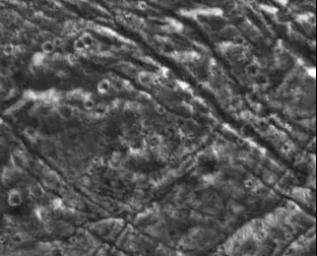
|
Ganymede Groove Lanes
- Click the image above for a larger view
- Full-Res JPEG (321 x 260) (16.7 kB)
- Full-Res TIFF (321 x 260) (87.4 kB)
Caption:
An ancient dark terrain surface is cut by orthogonal sets of fractures on Jupiter's moon Ganymede. Subdued pits visible on unbroken blocks are the remnants of impact craters which have degraded with time. Across the top of the image, a line of these subdued pits may have been a chain of craters which are now cut apart by the northwest to southeast trending fractures. North is to the top. Younger craters appear as bright circles. The fractures in this image range from less than 100 meters (328 feet) to over a kilometer (0.62 miles) in width. They display bright walls where cleaner ice may be exposed, and deposits of dark material fill their floors. This 27 by 22 kilometer (17 by 14 mile) image of northern Marius Regio was obtained on September 6, 1996 by NASA's Galileo spacecraft at a resolution of 85 meters (278 feet) per picture element (pixel).
Background Info:
The Jet Propulsion Laboratory, Pasadena, CA manages the Galileo mission for NASA's Office of Space Science, Washington, DC. JPL is an operating division of California Institute of Technology (Caltech).
This image and other images and data received from Galileo are posted on the World Wide Web, on the Galileo mission home page at URL http://galileo.jpl.nasa.gov. Background information and educational context for the images can be found at http://www.jpl.nasa.gov/galileo/sepo .
Cataloging Keywords:
| Name | Value | Additional Values |
|---|---|---|
| Target | Ganymede | |
| System | Jupiter | |
| Target Type | Satellite | |
| Mission | Galileo | |
| Instrument Host | Galileo Orbiter | |
| Host Type | Orbiter | |
| Instrument | Solid-State Imaging (SSI) | |
| Detector | ||
| Extra Keywords | Crater, Grayscale, Impact | |
| Acquisition Date | ||
| Release Date | 1997-11-18 | |
| Date in Caption | 1996-09-06 | |
| Image Credit | NASA/JPL/Brown University | |
| Source | photojournal.jpl.nasa.gov/catalog/PIA01056 | |
| Identifier | PIA01056 | |
